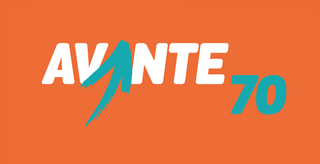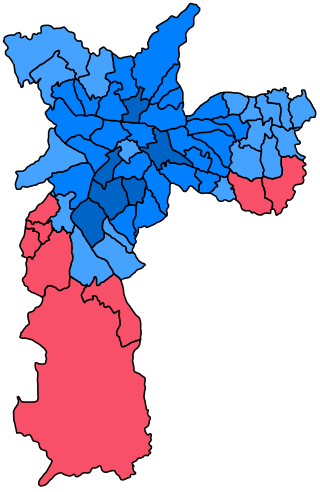
Recife is the state capital of Pernambuco, Brazil, on the northeastern Atlantic coast of South America. It is the second largest urban area within both the North and the Northeast Region of Brazil after Fortaleza. It is the largest city in Pernambuco state, and the sixth-largest urban area in all of Brazil; the metro population of the city of Recife was 3,726,974 in 2022. Recife was founded in 1537, serving as the main harbor of the Captaincy of Pernambuco—known for its large-scale production of sugar cane. At one point, it was known as Mauritsstad, when it served as the capital city of the 17th century colony of New Holland of Dutch Brazil. Situated at the confluence of the Beberibe and Capibaribe rivers, before they drain into the South Atlantic Ocean, Recife is a major seaport along the Brazilian Atlantic coast. Its name is an allusion to the stone reefs that are present offshore. Together with the urban presence of the Beberibe and Capibaribe rivers and their tributaries, the many additional unique, small islands—and more than 50 bridges linking them throughout the city—create a distinct maritime or "riviera" atmosphere, leading to Recife being known as the "Venice of Brazil".

The Communist Party of Brazil is a political party in Brazil. The PCdoB officially adheres to Marxist–Leninist theory. It has national reach and deep penetration in the trade union and student movements.

The Brazilian Communist Party, originally the Communist Party of Brazil, is a communist party in Brazil, founded on 25 March 1922. Arguably the oldest active political party in Brazil, it played an important role in the country's 20th-century history despite the relatively small number of members. A factional dispute led to the formation of PCdoB in the 1960s, though both communist parties were united in opposition to the Brazilian military government that ruled from 1964 to 1985. But with the fall of the Soviet Union and the collapse of communism circa 1990, the party lost power and international support. An internal coup in 1992 divided the party and formed a new party, called Popular Socialist Party, using the former identification number of the PCB, 23. That party has since moved towards the centre and now goes by the name Cidadania.

The National Mobilization is a political party in Brazil founded by politicians from the state of Minas Gerais on April 21, 1984, advocating for agrarian reform, termination of debt payments, ending of relations with the International Monetary Fund and formation of a trade bloc with other South American nations.

The Liberal Party is a conservative political party in Brazil. From its foundation in 2006 until 2019, it was called the Party of the Republic.

Avante is a centrist Brazilian political party. It was founded in 1989 by dissidents of the Brazilian Labour Party (PTB) as the Labour Party of Brazil and is a minor force in Brazilian politics.

São Joaquim is a municipality in the state of Santa Catarina, situated in southern Brazil. Its population in 2020 was 27,139 inhabitants. Located in the Planalto Serrano, it lies 136 km from Tubarão, 81 km from Lages and 227 km from Florianópolis. The town is home to a variety of ethnic groups, including Italian, German, Portuguese, Japanese and Afro-Brazilians. There are also many people from other states in Brazil, especially from Rio Grande do Sul.

The Brazilian Labour Party was a political party in Brazil registered in 1981. It was the seventh largest political party in Brazil with more than a million affiliated as of 2022.

Laerte Coutinho, known mainly as simply Laerte, is a Brazilian cartoonist and screenwriter, known for creating comic strips such as Piratas do Tietê.

The New Party is a classical liberal, libertarian party in Brazil founded on 12 February 2011.

The 2020 São Paulo municipal election took place in the city of São Paulo, Brazil, with the first round taking place on 15 November 2020 and the second round taking place on 29 November 2020. Voters voted to elect the Mayor, the Vice Mayor and 55 city councillors for the administration of the city. The result was a 2nd round victory for incumbent Mayor Bruno Covas of the Brazilian Social Democratic Party (PSDB), winning 3,169,121 votes and a share of 59,38% of the popular vote, defeating political activist Guilherme Boulos of the Socialism and Liberty Party (PSOL), who took 2,168,109 votes and a share of 40.62% of the popular vote.

Popular Unity, also known as Popular Unity for Socialism, is a Brazilian political party founded on 16 June 2016, which had its right to launch candidacies recognized by the Superior Electoral Court (TSE) on 10 December 2019. As a socialist party, it is connected to homeless workers' movements and defends the nationalization of the banking system, social control of all monopolies, capitalist consortia, and the means of production at-large, as well as rural land reform and collectivization.

The 2022 São Paulo state election took place in the state of São Paulo, Brazil on 2 October 2022 and 30 October 2022. Voters elected a Governor, Vice Governor, one Senator, 70 representatives for the Chamber of Deputies, and 94 Legislative Assembly members. The incumbent Governor, Rodrigo Garcia, of the Brazilian Social Democracy Party (PSDB), was eligible for a second term and ran for reelection.

The 2021 Brazilian protests were popular demonstrations that took place in different regions of Brazil in the context of the COVID-19 pandemic. Protests both supporting and opposing the government happened.

The Brazil Union is a liberal-conservative political party in Brazil. The party was founded on 6 October 2021 through the merger of the Democrats (DEM) and the Social Liberal Party (PSL). The merger resulted in the biggest party in Brazil, and was approved by Brazil's Superior Electoral Court on 8 February 2022.

Events in the year 2022 in Brazil.
General elections will be held in Brazil on 4 October 2026 to elect the president, vice president, members of the National Congress, the governors, vice governors, and legislative assemblies of all federative units, and the district council of Fernando de Noronha. If no candidate for president or governor receives a majority of the valid votes in the first round, a runoff election is held on 25 October.

The 2024 São Paulo municipal election took place on 6 October 2024, with a runoff held on 27 October. Voters elected a mayor, vice mayor, and 55 city council members. The incumbent mayor, Ricardo Nunes of the Brazilian Democratic Movement (MDB), ran for reelection.
The 2024 Salvador municipal election took place in the city of Salvador, Brazil on 6 October 2024. Voters will elect a mayor, vice mayor, and 43 councillors. The incumbent mayor, Bruno Reis, of the Brazil Union (UNIÃO), is able to run for a second term.



















